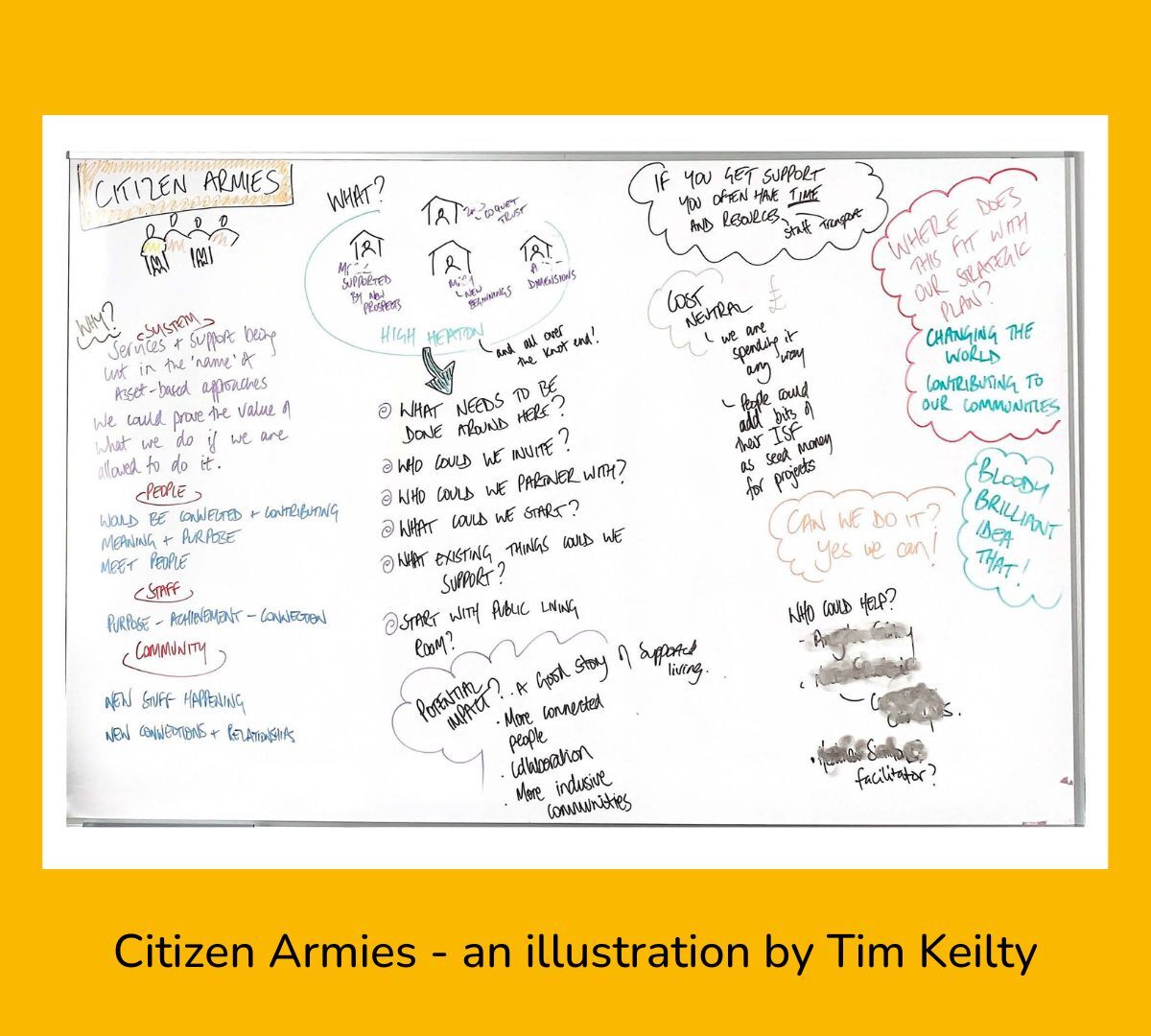Citizen Armies led by people with a learning disability will make inclusion in our communities work.
Author: Tim Keilty
Ages ago I used to write a blog called Tales from Serviceland, it is probably still available, but it will have flares and a tank top on because it is old.
In one of the posts, I slagged off the use of asset-based approaches, not because I don’t believe in them, practice them or bang on about them – rather I felt they were being used as a mask for cuts. I think I described it as clothing cuts in the language of plenty. That blog post was probably a decade ago – and there are a lot of cuts under the bridge since then.
Lately we’ve been trying something here loosely called Inclusion Grants where, rather than put something on here which will likely (no matter how hard we try to open it up) be attended solely by people we support, we fund someone to do it in the community, with the ask that they open it up to all.
We are currently funding an Armchair Warrior fitness class; paying the teacher and the room hire at a local community centre, that is the limit of our involvement, pay for it – see what happens.
I’m terrified to visit in case it isn’t inclusive. I’m worried that an Asset Based Worker will have found this community asset and filled it with people who might not be remotely interested in being fit, in an armchair or otherwise.
My other fear is that someone we support, call hum Bob, will have his support cut and instead of exploring the network of old coal tracks ‘The Waggonways’ with his brilliant support worker and his friends – keeping healthy, connected and lowering anxiety – he will find himself doing armchair Zumba under duress.
I recently attended a conference steeped in asset based approaches, brilliant work, which I am not slagging off. The workers doing this work were called ‘Liberated Workers’ these liberated workers described the people they worked with as ‘Citizens’.
In one of the workshops a lush woman who had been supported by the work said, “I used to be a citizen - then I had a liberated worker…” This will not be intentional but there is bugger all asset based if we create, even the illusion of more us and them.
Also, if you’ve walked around North Shields town centre or Kenton, you might notice that a lot of those assets have been closed, operate now on tiny pockets of time, or are being turned into ‘cultural’ things which are expensive and exclusive…ten years ago we were seeing the decimation of the voluntary sector, youth services, libraries, parks - it hasn’t improved.
I know places aren’t the only assets, but we have a habit of paying the consultancy organisation to teach us the method (similar ideas regardless of logo), training the workforce and forgetting about the real infrastructure – people and places. Like Social Prescribing where we paid for the prescribers and the paper the prescription was written on but not for the medicine.
My particular passion since I was 16 years old has been people with a learning disability. I think and talk about little else. The imperfect way we support these people is under threat. On paper ‘THESE PEOPLE ARE EXPENSIVE’ leaps out, and cuts are the new currency.
Obviously, I know my place as a provider of services, realise that I don’t ‘get’ community, am only in it for ‘the hours’ etc. etc. I want to prove that however imperfect, we CAN do this stuff.
We recently hosted a conference in Newcastle with Simon Duffy and Wendy Perez, it was brilliant - lush people, families, people who get support, their supporters, people from different organisations, local authorities. The idea behind the conference being that we sat down as equal citizens and figured out “how do we make this citizenship stuff real for all of us?”
Lots of things from the day stuck, what stuck most was a phrase from Simon which I’ve heard before but not acted on:
“People with a learning disability often make the very best citizens. As well as their own gifts and skills, they often have time. If they’ve got staff that’s another resource – you could be a citizen army.”
So here we are again with a picture featuring houses and arrows, no cider aiding this one, I did it at work.

In essence, we build a network of people in their distinct neighbourhood who are up for it, supported by their team from whichever organisation supports them. We gather as a Citizen Army – no uniforms (yet) we are quiet, we are gentle, we share, then we make plans and decide to asset-based develop the arse out of High Heaton; creating, welcoming and pulling in more people over time.
The potential impacts are huge, for people, communities and organisations:
We will start small and build Citizen Armies led by people with a learning disability and their teams all over the knot end. If supported living is under threat ‘because it is expensive’ we will prove it works.
We will go down fighting.
If any workers (asset based/liberated or otherwise) come looking for assets to ‘informally support someone’ with - they will feel the full wrath of our army – after we’ve given them a cup of tea and a biscuit and welcomed them as a ‘citizen’ of course.
A few of us here in the North East are quietly sewing uniforms – we will keep you posted!
The publisher is Citizen Network Research. Citizen Armies © Tim Keilty 2024.
community, Inclusion, Keys to Citizenship, Neighbourhood Care, social care, England, Article